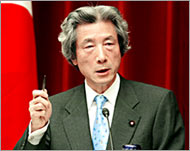Japan media warned over Iraq mission
Ahead of its most sensitive dispatch of troops abroad since World War II, the Japanese government has warned media not to “obstruct” its mission in Iraq or face a news blackout, a stance that has local critics fuming.

A letter to the media from the Defence Agency last week was labelled by critics as a reminder of Japan’s wartime censorship, and an affront to the freedoms it pledged to help restore in war-battered Iraq.
“Japan’s militant nationalism has gone, but the methods for controlling the Japanese media have remained,” Teruo Ariyama, a journalism professor at Tokyo Keizai University, told AFP.
“The Japan Defence Agency will decide what information is safe or not and no one can inspect what the standard is,” Ariyama said.
Humanitarian mission
On 9 December, after months of procrastination over the security situation in Iraq and concern over local and Asian sensitivities to sending troops overseas, Tokyo announced that up to 600 ground troops would be sent to the country on a humanitarian mission.
A military send-off with a guard of honour was held on Friday for an advance party of about 30 soldiers leaving later in the day for Kuwait before travelling overland to Iraq later in the month.
While their main task will be to supply clean water in Samawa,
southern Iraq, an area picked for its relative safety, it still
marks the first time since World War II that Japanese troops will enter a country where fighting is ongoing.
Requests
 |
|
Koizumi wants media to consider |
On Friday last week, the Defense agency sent all media outlets a request to refrain from reporting information that could “influence the security” of the troops, warning that if outlets “obstruct the completion of our mission”, interview requests could be denied.
Among several specific requests, it asked for restraint in publishing the timing of the deployments, since many personnel would fly on commercial aircraft also used by civilians.
Prime Minister Junichiro Koizumi told reporters the requests “just means that we want you to report while taking security issues into consideration.”
Wartime propaganda
|
“It is the role of news organisations to answer the public’s right to know. Even if we take into consideration the safety of troops, we cannot accept the Defense Agency’s request as it is” Japan Broadcasting Corp |
But analysts said the intention was just the opposite. “This is no different than the (wartime propaganda) ‘Announcement from Imperial General Headquarters’,” wrote Rikkyo University mass media professor Takaaki Hattori in the Mainichi Shimbun newspaper.
“The brazen, anachronistic attitude of the Defence Agency is nothing short of amazing,” he wrote.
News outlets insisted they would exercise their own judgment as to what to report.
Publicly funded network Japan Broadcasting Corp. (NHK) said it would continue to report developments on the ground “as they happen”.
“It is the role of news organisations to answer the public’s
right to know,” it said in a statement to AFP. “Even if we take into consideration the safety of troops, we cannot accept the Defence Agency’s request as it is.”
Security tightened
Police beefed up security at major airports, train stations, as well as the US Embassy and other key facilities to guard against possible “terrorist attacks”, a National Police Agency official said on condition of anonymity.
Japan has heightened its security vigilance after a purported al-Qaida operative warned last November that Tokyo would be targeted if Japan followed through with the dispatch plans.